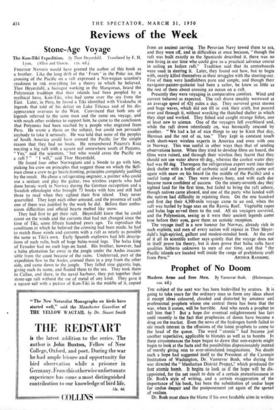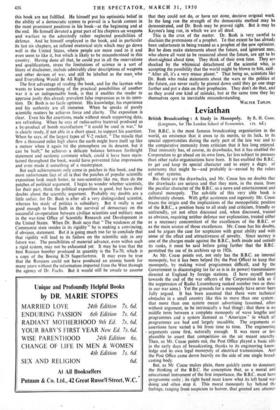Prophet of No Doom
Modern Arms and Free Men. By Vannevar Bush. (Heinemann. los. 6d.) THE subject of the next war has been bedevilled by orators. It is going to take years for the ordinary man to form any ideas about it except ideas coloured, clouded and distorted by amateur and professional prophets whose one central thesis has been that the war, when it comes, will be horrible. And who needs a prophet to tell him that ? But a hope .for eventual enlightenment has lain until recently in the fact that prophecies of doom have become a drug on the market. Even the news of the hydrogen bomb failed to stir much interest in the effusions of the latest prophets to come to the head of the queue. The word " atomic " had become just another superlative, applicable to blondes as well as to bombs. In these circumstances the hope began to dawn that non-experts might begin to look at the facts and the possibilities dispassionately instead of merely giving rein to over-stimulated.. imaginations. No doubt such a hope had suggested itself to the President of the Carnegie Institution of Washington, Dr. Vannevar Bush, who during the war directed the " Manhattan District Project," which produced the first atomic bomb. It begins to look as if the hope will be dis- appointed, for the net result to date of a certain pretentiousness in Dr. Bush's style of writing, and a certain exaggeration of the importance of his book, has been the substitution of undue hope for undue despair and the postponement yet again of the spread of realism. • Dr. Bush must share the blame if his own laudable aims in writing this book are not fulfilled. He himself put his optimistic belief in the ability of a democratic system to prevail in a harsh contest in the most prominent positions in his book—at the beginning and at the end. He himself devoted a great part of his chapters on weapons and warfare to the admittedly rather neglected possibilities of defence. And he himself employed in the book, and in particular its last six chapters, an inflated oratorical style which may go down well in the United States, where people are more used to it and even seem to like it, but which is likely to be misunderstood in this country. Having done all that, he could put in all the reservations and qualifications, stress the limitations of science in a sort of litany of disclaimer, include admirably clear descriptions of weapons -and other devices of war, and still be labelled as the man who said Everything Would Be All Right.
The first advantage of reading the book, and for the layman who wants to know something of the practical possibilities of another war it is an indispensable book, is that it enables the reader to appraise justly this already prevalent false impression as to its inten- tion. Dr. Bush is no facile optimist. His knowledge, his experience and his authority are all immense. When he speaks of purely scientific matters he achieves force and clarity. The exposition is clear. Even his flat assertions, made without much supporting data, are refreshing. When he says of radio-active Material produced as a by-product of bomb manufacture "it could be used in war," he is clearly ready, if not able in a short space, to support his assertion. When he says, of the largest types of V-2 rocket, " The missile that flew a thousand miles high above the earth might burn itself up like a meteor when it again hit the atmosphere on its descent, but it can be built," he achieves a delicate balance between forthright statement and sardonic comment which, could it have been main- tained throughout the book, would have prevented false impressions and even made it something of a masterpiece.
But such achievements only come in patches in this book, and the most unfortunate fact of all is that the patches of popular scientific exposition look much better, to non-scientists like me, than do the patches of political argument. I begin to wonder whether scientists, for their part, think the political exposition is good, but have their doubts about the scientific argument. Probably my doubts are a little unfair, for Dr. Bush is after all a very distinguished scientist, whereas his study of politics is subsidiary. But it really is not good enough to base faith in the survival of democracy on the successful co-operation between civilian scientists and military men in the war-time Office of Scientific Research and Development in the United States. When Dr. Bush says that " The weakness of the Communist state resides in its rigidity " he is making a convincing, if obvious, statement. But it is going much too far to conclude that that rigidity will lead to its failure on the scientific side in any future war. The possibilities of material advance, even within such a rigid system, may not be exhausted yet. It may be true that the best Russian bomber produced in quantity is the Tu-70, which is a copy of the Boeing B-29 Superfortress. It may even be true that the Russians could not have produced an atomic bomb for many years without the information imported from the West through the agency of Dr. Fuchs. But it would still be unsafe to assume
that they could not do, or have not done, decisive original work. In the long run the strength of the democratic method may be demonstrated, and Dr. Bush may be proved right.. But it may be Keynes's long run, in which we are all dead.
This is the crux of the matter. Dr. Bush is very careful to disclaim the pretensions of a prophet. To that extent he has already been unfortunate in being treated as a prophet of the new optimism. But he does make statements about the future, and ignorant men, who above all want to be reassured about the future, are apt to be short-sighted about time. They think of their own time. They are shocked by the whimsical detachment of the scientist who, in accepting the possibility that the world might be blown to bits, said: " After all, it's a very minor planet." That being so, scientists like Dr. Bush who make statements about the wars or the politics of the future, can never really be pinned down until they go one stage further and put a date on their prophecies. They don't do that, and so they avoid one kind of mistake, but at the same time they lay themselves open to inevitable misunderstanding.
WALTER TAPLIN.







































 Previous page
Previous page